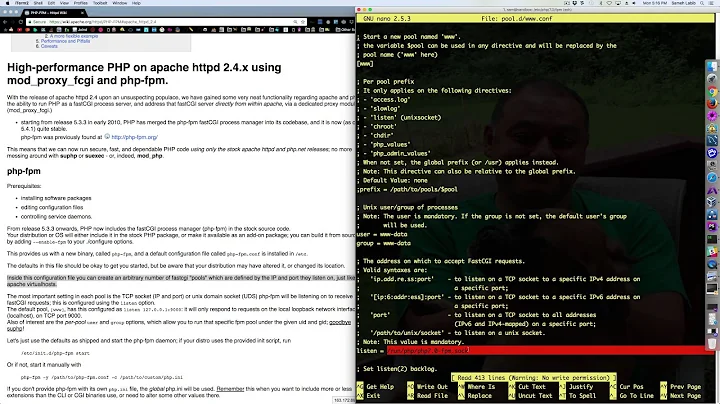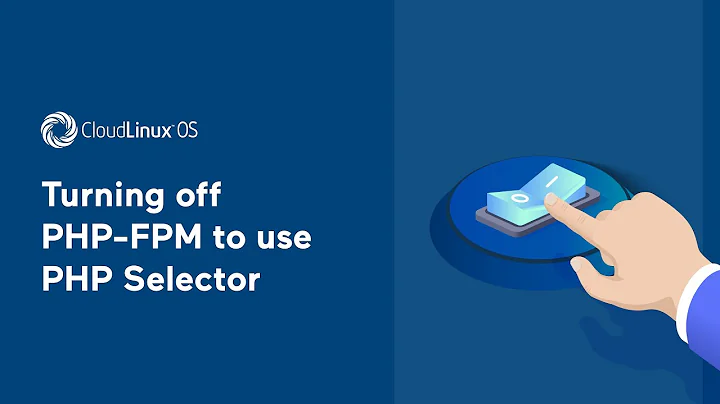PHP-FPM Constantly Restarting Pools - Zombie's Everywhere!
9,845
Solution 1
(comment by OP solved the issue)
Turned off dynamic pooling and it has "fixed" the problem for now. – Nate Wienert Jan 19 at 0:44
Solution 2
Change log_level to 'notice' to get rid of those messages.
Related videos on Youtube
Author by
Nate Wienert
Updated on September 18, 2022Comments
-
Nate Wienert over 1 year
Ok so after a recent incident in which I ran "chown -R root:root" on my entire /var directory on accident (XO.. I know...) I've been dealing with php-fpm issues. I've tried fixing permissions in a number of ways with no luck but I'm getting constant restarts spawning tons of zombie processes whenever php5-fpm is running.
The /var/log/php5-fpm.log show this over and over every single second:
[18-Jan-2012 13:22:44.443707] DEBUG: pid 31440, fpm_pctl_perform_idle_server_maintenance(), line 348: [pool web4] currently 0 active children, 4 spare children, 4 running children. Spawning rate 1 [18-Jan-2012 13:22:45.443972] DEBUG: pid 31440, fpm_pctl_perform_idle_server_maintenance(), line 348: [pool web7] currently 0 active children, 20 spare children, 20 running children. Spawning rate 1 [18-Jan-2012 13:22:45.444019] DEBUG: pid 31440, fpm_pctl_perform_idle_server_maintenance(), line 348: [pool web3] currently 0 active children, 4 spare children, 4 running children. Spawning rate 1 [18-Jan-2012 13:22:45.444032] DEBUG: pid 31440, fpm_pctl_perform_idle_server_maintenance(), line 348: [pool web1] currently 0 active children, 4 spare children, 4 running children. Spawning rate 1 [18-Jan-2012 13:22:45.444040] DEBUG: pid 31440, fpm_pctl_perform_idle_server_maintenance(), line 348: [pool ispconfig] currently 0 active children, 4 spare children, 4 running children. Spawning rate 1 [18-Jan-2012 13:22:45.444048] DEBUG: pid 31440, fpm_pctl_perform_idle_server_maintenance(), line 348: [pool apps] currently 0 active children, 4 spare children, 4 running children. Spawning rate 1 [18-Jan-2012 13:22:45.444057] DEBUG: pid 31440, fpm_pctl_perform_idle_server_maintenance(), line 348: [pool www] currently 0 active children, 4 spare children, 4 running children. Spawning rate 1 [18-Jan-2012 13:22:45.444064] DEBUG: pid 31440, fpm_pctl_perform_idle_server_maintenance(), line 348: [pool web4] currently 0 active children, 4 spare children, 4 running children. Spawning rate 1My php_fpm.conf relevant file info: ;;;;;;;;;;;;;;;;;;;;; ; FPM Configuration ; ;;;;;;;;;;;;;;;;;;;;;
; All relative paths in this configuration file are relative to PHP's install ; prefix (/usr). This prefix can be dynamicaly changed by using the ; '-p' argument from the command line. ; Include one or more files. If glob(3) exists, it is used to include a bunch of ; files from a glob(3) pattern. This directive can be used everywhere in the ; file. ; Relative path can also be used. They will be prefixed by: ; - the global prefix if it's been set (-p arguement) ; - /usr otherwise ;include=/etc/php5/fpm/*.conf ;;;;;;;;;;;;;;;;;; ; Global Options ; ;;;;;;;;;;;;;;;;;; [global] ; Pid file ; Note: the default prefix is /var ; Default Value: none pid = /var/run/php5-fpm.pid ; Error log file ; Note: the default prefix is /var ; Default Value: log/php-fpm.log error_log = /var/log/php5-fpm.log ; Log level ; Possible Values: alert, error, warning, notice, debug ; Default Value: notice log_level = debug ; If this number of child processes exit with SIGSEGV or SIGBUS within the time ; interval set by emergency_restart_interval then FPM will restart. A value ; of '0' means 'Off'. ; Default Value: 0 emergency_restart_threshold = 4 ; Interval of time used by emergency_restart_interval to determine when ; a graceful restart will be initiated. This can be useful to work around ; accidental corruptions in an accelerator's shared memory. ; Available Units: s(econds), m(inutes), h(ours), or d(ays) ; Default Unit: seconds ; Default Value: 0 emergency_restart_interval = 10s ; Time limit for child processes to wait for a reaction on signals from master. ; Available units: s(econds), m(inutes), h(ours), or d(ays) ; Default Unit: seconds ; Default Value: 0 ;process_control_timeout = 10s ; Send FPM to background. Set to 'no' to keep FPM in foreground for debugging. ; Default Value: yes ;daemonize = yes ;;;;;;;;;;;;;;;;;;;; ; Pool Definitions ; ;;;;;;;;;;;;;;;;;;;; ; Multiple pools of child processes may be started with different listening ; ports and different management options. The name of the pool will be ; used in logs and stats. There is no limitation on the number of pools which ; FPM can handle. Your system will tell you anyway :) ; To configure the pools it is recommended to have one .conf file per ; pool in the following directory: include=/etc/php5/fpm/pool.d/*.confAnd my pool.d/www.conf
; Start a new pool named 'www'. ; the variable $pool can we used in any directive and will be replaced by the ; pool name ('www' here) [www] ; Per pool prefix ; It only applies on the following directives: ; - 'slowlog' ; - 'listen' (unixsocket) ; - 'chroot' ; - 'chdir' ; - 'php_values' ; - 'php_admin_values' ; When not set, the global prefix (or /usr) applies instead. ; Note: This directive can also be relative to the global prefix. ; Default Value: none ;prefix = /path/to/pools/$pool ; The address on which to accept FastCGI requests. ; Valid syntaxes are: ; 'ip.add.re.ss:port' - to listen on a TCP socket to a specific address on ; a specific port; ; 'port' - to listen on a TCP socket to all addresses on a ; specific port; ; '/path/to/unix/socket' - to listen on a unix socket. ; Note: This value is mandatory. #listen = 127.0.0.1:9010 listen = /var/run/php5-fpm.sock ; Set listen(2) backlog. A value of '-1' means unlimited. ; Default Value: 128 (-1 on FreeBSD and OpenBSD) ;listen.backlog = -1 ; List of ipv4 addresses of FastCGI clients which are allowed to connect. ; Equivalent to the FCGI_WEB_SERVER_ADDRS environment variable in the original ; PHP FCGI (5.2.2+). Makes sense only with a tcp listening socket. Each address ; must be separated by a comma. If this value is left blank, connections will be ; accepted from any ip address. ; Default Value: any listen.allowed_clients = 127.0.0.1 ; Set permissions for unix socket, if one is used. In Linux, read/write ; permissions must be set in order to allow connections from a web server. Many ; BSD-derived systems allow connections regardless of permissions. ; Default Values: user and group are set as the running user ; mode is set to 0666 listen.owner = www-data listen.group = www-data listen.mode = 0666 ; Unix user/group of processes ; Note: The user is mandatory. If the group is not set, the default user's group ; will be used. user = www-data group = www-data ; Choose how the process manager will control the number of child processes. ; Possible Values: ; static - a fixed number (pm.max_children) of child processes; ; dynamic - the number of child processes are set dynamically based on the ; following directives: ; pm.max_children - the maximum number of children that can ; be alive at the same time. ; pm.start_servers - the number of children created on startup. ; pm.min_spare_servers - the minimum number of children in 'idle' ; state (waiting to process). If the number ; of 'idle' processes is less than this ; number then some children will be created. ; pm.max_spare_servers - the maximum number of children in 'idle' ; state (waiting to process). If the number ; of 'idle' processes is greater than this ; number then some children will be killed. ; Note: This value is mandatory. pm = dynamic ; The number of child processes to be created when pm is set to 'static' and the ; maximum number of child processes to be created when pm is set to 'dynamic'. ; This value sets the limit on the number of simultaneous requests that will be ; served. Equivalent to the ApacheMaxClients directive with mpm_prefork. ; Equivalent to the PHP_FCGI_CHILDREN environment variable in the original PHP ; CGI. ; Note: Used when pm is set to either 'static' or 'dynamic' ; Note: This value is mandatory. pm.max_children = 24 ; The number of child processes created on startup. ; Note: Used only when pm is set to 'dynamic' ; Default Value: min_spare_servers + (max_spare_servers - min_spare_servers) / 2 pm.start_servers = 4 ; The desired minimum number of idle server processes. ; Note: Used only when pm is set to 'dynamic' ; Note: Mandatory when pm is set to 'dynamic' pm.min_spare_servers = 2 ; The desired maximum number of idle server processes. ; Note: Used only when pm is set to 'dynamic' ; Note: Mandatory when pm is set to 'dynamic' pm.max_spare_servers = 6 ; The number of requests each child process should execute before respawning. ; This can be useful to work around memory leaks in 3rd party libraries. For ; endless request processing specify '0'. Equivalent to PHP_FCGI_MAX_REQUESTS. ; Default Value: 0 ;pm.max_requests = 500 ; The URI to view the FPM status page. If this value is not set, no URI will be ; recognized as a status page. By default, the status page shows the following ; information: ; accepted conn - the number of request accepted by the pool; ; pool - the name of the pool; ; process manager - static or dynamic; ; idle processes - the number of idle processes; ; active processes - the number of active processes; ; total processes - the number of idle + active processes. ; max children reached - number of times, the process limit has been reached, ; when pm tries to start more children (works only for ; pm 'dynamic') ; The values of 'idle processes', 'active processes' and 'total processes' are ; updated each second. The value of 'accepted conn' is updated in real time. ; Example output: ; accepted conn: 12073 ; pool: www ; process manager: static ; idle processes: 35 ; active processes: 65 ; total processes: 100 ; max children reached: 1 ; By default the status page output is formatted as text/plain. Passing either ; 'html' or 'json' as a query string will return the corresponding output ; syntax. Example: ; http://www.foo.bar/status ; http://www.foo.bar/status?json ; http://www.foo.bar/status?html ; Note: The value must start with a leading slash (/). The value can be ; anything, but it may not be a good idea to use the .php extension or it ; may conflict with a real PHP file. ; Default Value: not set ;pm.status_path = /status ; The ping URI to call the monitoring page of FPM. If this value is not set, no ; URI will be recognized as a ping page. This could be used to test from outside ; that FPM is alive and responding, or to ; - create a graph of FPM availability (rrd or such); ; - remove a server from a group if it is not responding (load balancing); ; - trigger alerts for the operating team (24/7). ; Note: The value must start with a leading slash (/). The value can be ; anything, but it may not be a good idea to use the .php extension or it ; may conflict with a real PHP file. ; Default Value: not set ;ping.path = /ping ; This directive may be used to customize the response of a ping request. The ; response is formatted as text/plain with a 200 response code. ; Default Value: pong ;ping.response = pong ; The timeout for serving a single request after which the worker process will ; be killed. This option should be used when the 'max_execution_time' ini option ; does not stop script execution for some reason. A value of '0' means 'off'. ; Available units: s(econds)(default), m(inutes), h(ours), or d(ays) ; Default Value: 0 ;request_terminate_timeout = 0 ; The timeout for serving a single request after which a PHP backtrace will be ; dumped to the 'slowlog' file. A value of '0s' means 'off'. ; Available units: s(econds)(default), m(inutes), h(ours), or d(ays) ; Default Value: 0 ;request_slowlog_timeout = 0 ; The log file for slow requests ; Default Value: not set ; Note: slowlog is mandatory if request_slowlog_timeout is set ;slowlog = log/$pool.log.slow ; Set open file descriptor rlimit. ; Default Value: system defined value ;rlimit_files = 1024 ; Set max core size rlimit. ; Possible Values: 'unlimited' or an integer greater or equal to 0 ; Default Value: system defined value ;rlimit_core = 0 ; Chroot to this directory at the start. This value must be defined as an ; absolute path. When this value is not set, chroot is not used. ; Note: you can prefix with '$prefix' to chroot to the pool prefix or one ; of its subdirectories. If the pool prefix is not set, the global prefix ; will be used instead. ; Note: chrooting is a great security feature and should be used whenever ; possible. However, all PHP paths will be relative to the chroot ; (error_log, sessions.save_path, ...). ; Default Value: not set ;chroot = ; Chdir to this directory at the start. ; Note: relative path can be used. ; Default Value: current directory or / when chroot chdir = / ; Redirect worker stdout and stderr into main error log. If not set, stdout and ; stderr will be redirected to /dev/null according to FastCGI specs. ; Note: on highloaded environement, this can cause some delay in the page ; process time (several ms). ; Default Value: no catch_workers_output = yes ; Pass environment variables like LD_LIBRARY_PATH. All $VARIABLEs are taken from ; the current environment. ; Default Value: clean env ;env[HOSTNAME] = $HOSTNAME ;env[PATH] = /usr/local/bin:/usr/bin:/bin ;env[TMP] = /tmp ;env[TMPDIR] = /tmp ;env[TEMP] = /tmp ; Additional php.ini defines, specific to this pool of workers. These settings ; overwrite the values previously defined in the php.ini. The directives are the ; same as the PHP SAPI: ; php_value/php_flag - you can set classic ini defines which can ; be overwritten from PHP call 'ini_set'. ; php_admin_value/php_admin_flag - these directives won't be overwritten by ; PHP call 'ini_set' ; For php_*flag, valid values are on, off, 1, 0, true, false, yes or no. ; Defining 'extension' will load the corresponding shared extension from ; extension_dir. Defining 'disable_functions' or 'disable_classes' will not ; overwrite previously defined php.ini values, but will append the new value ; instead. ; Note: path INI options can be relative and will be expanded with the prefix ; (pool, global or /usr) ; Default Value: nothing is defined by default except the values in php.ini and ; specified at startup with the -d argument ;php_admin_value[sendmail_path] = /usr/sbin/sendmail -t -i -f [email protected] ;php_flag[display_errors] = off php_admin_value[error_log] = /var/log/fpm-php.www.log ;php_admin_flag[log_errors] = on ;php_admin_value[memory_limit] = 32M-
Nate Wienert over 12 yearsTurned off dynamic pooling and it has "fixed" the problem for now.
-
-
Mark about 9 yearsI have a bit more info on this. It's a php setting in php-fpm.conf. I found mine in /etc/php5/fpm/php-fpm.conf. community.centminmod.com/threads/strange-error-log.1935
-
 Viet Nguyen over 3 yearsThanks, I getting 502 Bad Gateway but fixed by your awsome answer :D
Viet Nguyen over 3 yearsThanks, I getting 502 Bad Gateway but fixed by your awsome answer :D




